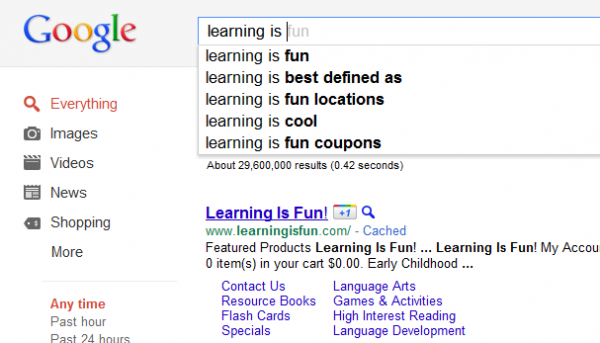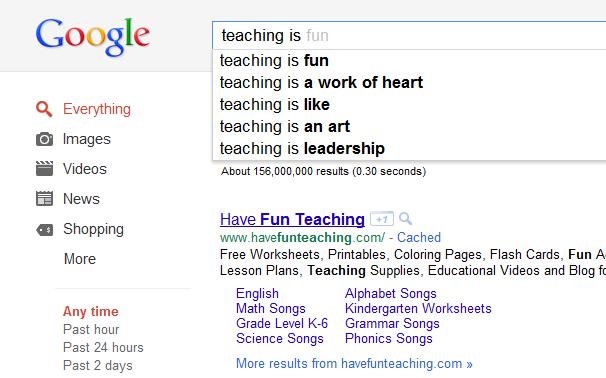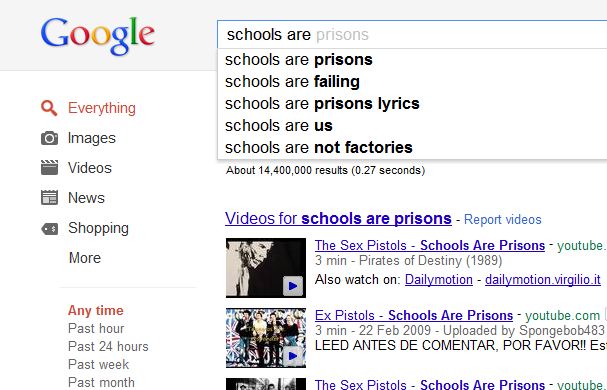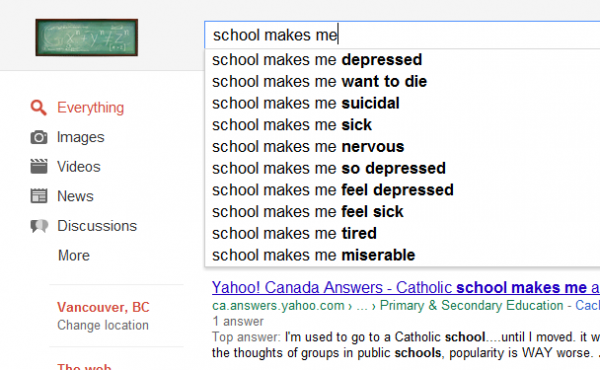This presentation is based in part on the TED talk Conrad Wolfram gave a couple of years ago, and on some insights gained at the Computer Based Math summit I attended in November. The below presentation is slightly abreviated to make it easier to share on the web.
Tag: education (page 4 of 13)
Here are the slides for a presentation I did at the University of Alberta Technology Fair.
Two authors of a controversial paper from the Heritage Foundation suggest that teachers are overpaid for their efforts. Here is my response.
The US economy dropped by 15.6% in 2009 for a total loss of $2, 342, 400, 000, 000. The people responsible for this disaster to the economy almost all received million dollar bonuses for their efforts.
From this I can deduce that the relationship between compensation for one’s "work" and what one does, or knows how to do, is not as straight forward as the authors of this paper claim.
All compensation is political. We choose to compensate some people differently than others for historical reasons, for political reasons, and obviously for economic reasons, but to ignore the historical and political aspects of compensation is to make a grave error in one’s research.
Thoughts? Do you think teachers are overpaid?
This is a list my son created of things he wanted to make sure he got done for the day.

Does this make my son a writer? Is it more important that he is attempting to use text to get out his thoughts? Or is it more important that I help him correct the mistakes that he has made to make him a ‘better’ writer?
I’m of the opinion, at least at this stage, that we allow our son to make mistakes without being overly concerned about correcting them. Once he learns how to read, he will naturally learn how to spell better, and he will also learn more of the rules about how we write things down. At this stage grammar, and structure are somewhat unimportant, and just being willing to experiment and make an attempt is of critical importance.
What do you think?
I tried a little experiment today with Google. I started by typing "learning is " into Google and waiting to see what the auto-suggest feature would come up with.

Next, I typed "Teaching is " into the auto-suggest.

Finally, I typed "Schools are " into Google.com.

As I understand it, Google pulls the auto-suggest phrases from the most commonly typed search phrases people use. In other words, the auto-suggest phrases represent the opinions of people using the Google search engine.
Now while I think lots of schools are fun, and it would be wrong to characterize most schools as prisons, at the very least we have a marketing problem. One would assume that if people think learning is fun, and teachers think teaching is fun, then the institutions where both of these things happen should be fun, right?
Why then do the search results above come up? Is everyone searching for the song "Schools are prisons" by the Sex Pistols? Or do we have a larger problem?
Update: @sjhughes shared this one. Google "school makes me" and you’ll see some more opinions of students about school.

(Clay Shirky: How social media can make history)
While education reformers like Michelle Rhee, Joel Klein, Bill Gates, and others will tell you that education is stuck in the status quo, right underneath their noses there is a quiet revolution occurring in education.
The revolution is happening through social media. Every day thousands of hours are spent by educators, even during the summer, to improve their personal practice through discussion and sharing of resources. Every day more and more educators are joining the fray, choosing to sign up for social media sites (like Twitter) so that they can become part of the conversation on education reform. While the number of educators not yet sharing their ideas dwarfs the number sharing, those that are sharing are vocal about the benefits that they are getting and inviting their colleagues daily to join them.
There are probably 50,000 educators using Twitter alone, and if each of these teachers posts just 1 average length tweet a day, that’s about 500,000 words written each day on education by people in the trenches. If each teacher on Twitter reads just 10 tweets a day, that would mean that more than 5,000,000 words about education are read each day via Twitter (The actual numbers are likely to be much higher than these conservative estimates).
Outside of Twitter, educators are connecting through Classroom 2.0, Future of Education, and literally thousands of other Nings and professional development sites. There are almost certainly thousands upon thousands of conversations between educators, about education, happening on Facebook every day as well.
Educators are doing much in the non-digital world to connect as well. Edcamps and Teachmeets, which are free professional development conferences, have sprung up all over the world. Educators are organizing TEDx conferences, like TEDxUBC, TEDxDenverEd, and TEDxPhillyEd, to name just a few (I attended all three of these).
This is all done outside of the more traditional professional development avenues, and it is having an impact on education. Teachers are flipping their classrooms, engaging in education hackjams, discussing educational practices in massive weekly Edchats, presenting their innovative educational practices with thousands of other educators via online webinars, and much, much more.
Much of this quiet revolution is happening during times when educators would have traditionally been off work, during their summers, their breaks, and at their homes, challenging the idea that educators aren’t willing either to change, or to spend their own time doing it. Educators are not being paid to participate in the opportunities discussed above, nor are they being given much support.
Instead of blaming all of the current problems of education on educators, maybe it’s time to support the thousands of innovative educators out there taking matters into their own hands? None of the accountability systems in place, or being developed, accounts for the incredible professional sharing occurring globally in education today.
The grassroots efforts are a much more effective way to introduce systemic change than top-down efforts ever will be since peer pressure is always stronger than authorative pressure.
"Feminism is a collection of movements aimed at defining, establishing, and defending equal political, economic, and social rights and equal opportunities for women." Source: http://en.wikipedia.org/wiki/Feminism
Under this definition of feminism, I am a feminist. I hope that many educators would count themselves as feminists under this definition. However, we still have many issues around gender equality in our education system which we need to fix.
When we spend unequal amounts of money on our sports teams, and promote the boys’ sports more than the girls’ sports, we send the message to our girls that what they do is unimportant.
When we call on the boys in our class more than the girls and encourage reflection and deeper thinking from the boys, we are implicitly telling the girls that what they think is unimportant.
When we hire disproportionally more male administrators in schools than female administrators, we tell girls that they aren’t supposed to be in charge. In BC, for example, female teachers outnumber male teachers by a 2 to 1 ratio, but are nearly evenly split at the administrative level. While this is changing, we have a long way to go. Can anyone tell me why female teachers make, on average, $4000 a year less than their male counterparts in British Columbia?
When our prescribed learning outcomes do not specifically talk about the role of media in defining gender for our society, there is little hope that we can counteract the effect of media. Fortunately, gender is discussed in our curriculum in British Columbia, all of 14 times.
It is critical that each of us who are educators, who are helping shape the role of gender in our society, publicly identify ourselves as feminists. We must actively work to break down the rigid gender roles our society defines, because one of the places change happens in our society is in education, and if the inequality between the genders persists, it will be at least partially because of our inaction.

(image credit: dionnehartnett)
One basic assumption we often have about life is that there is only way to get things done. We struggle to see paths other than the one before us. Sometimes we are so blind to the alternate views of reality that we construct arguments against why they are possible, rather than accepting the evidence in front of our eyes.
I recently discovered that there are at least 2 other ways of tying one’s shoes, for example, a fact I did not know for nearly 30 years. I have almost certainly witnessed literally thousands of different people tying their shoes over the years but have never noticed these other methods before now. I only noticed because I’ve been helping my son learn how to tie his own shoes, I’ve been reflecting on how shoes are tied, and then suddenly noticed that there are people who’s shoes are tied using completely different methods than what I’m familiar.
If I can be wrong about something simple like shoes being tied, what else could I be wrong about? Maybe one reason why education reform is such a struggle right now is that the many sides of the debate can only see the direction with which they are familiar? I don’t think that my vision of what education reform should be is wrong, but am I being myopic?

(image credit: bertiemabootoo)
Every path has a fork. Sometimes you can double-back and try a different path, but you are never stuck on the one you’ve chosen. No path is one way. One thing is clear though, it is rare that two forks of a path lead to the same place. Let us remember that while we may not like the path that is being chosen for us in education reform, when the pendulum swings again, we can retrace our steps, and hopefully undo a lot of the damage that is being done.
I’d like to help the people in charge of the reform see that they are on what I think is the wrong path, but I also need to keep my eyes open and look for the evidence they see that convinces them that they are on the right path. Without understanding why they are so sure of their direction, I cannot expect to be able to convince them of the error of their ways. Similarly, I must be open to the possibility that it is me who is on the wrong path.
I don’t think that’s true though. I just think I have a different destination in mind.
If we want to discuss whether or not our k to 12 education system is successful, we must first examine its possible purposes.
Suppose the purpose of our education system is to produce kids who are ready for college. Given that only 61.9% of students (in Canada) even attend college, and that not all of those people complete college, then our system is failing at least 40% of its youth by this measure of its success.
What if instead the purpose of our education system is to produce kids who participate actively in democracy? At the very least, voting in an election should demonstrate an active participation in democracy. Given that in the year 2000 only 22.4% of youth aged 18 to 20 voted, and that this number has been decreasing steadily since the 1970s, it should be obvious that in this possible purpose of education, we are failing dismally.
Another possible purpose of our education system could be to produce students who are literate and numerate. According to government statistics, 46% of Canadians are not literate enough and 55% of Canadians lack sufficient numeracy to be successful in society. Clearly we are failing many people in this respect.
Perhaps our education system is designed to produce people who are critical thinkers, or alternatively, life-long learners. Without literacy and numeracy skills (see previous paragraph), one could easily argue that it is extremely difficult to be a critical thinker, or a life-long learner, so we are likely failing many people with these other two possible purposes of education as well.
Other possible purposes for our education system could be to indoctrinate our youth with our societal values, create compliant citizens for a factory model of work, or to act as child-care for families where both parents work. Finding statistics to verify that the first two of these purposes are being met is difficult, given that it is rare that anyone admits that they could even be purposes of education. As for the successfulness of our system in acting as child-care, it seems that it is an awfully expensive way to provide child-care, but it is true that our education system does provide many hours of supervision each day.
Personally, I don’t think that the last three purposes of education, which might be the only ones in which we are being successful, are sufficient purposes of education. We must do more than merely train our youth to be compliant, teach them how to be nice people, and provide child-care for parents.
I’m a strong supporter of our current system, and I wouldn’t recommend that we tear it down. However, I don’t think we can pretend that it is working as it should, under any definition of success. Something needs to change.

I saw some little kids and their parents at a lemonade stand on Sunday, and I thought to myself, "how cute!" I found out that the proceeds from the lemonade stand were going to be used to help fund sports equipment and other necessary supplies at a local elementary school, and I thought to myself, "how sad."
Wouldn’t it be nice to live in a world where lemonade stands were set up by kids for "extra money"? Shouldn’t we fund education sufficiently so that first graders can worry about other things?